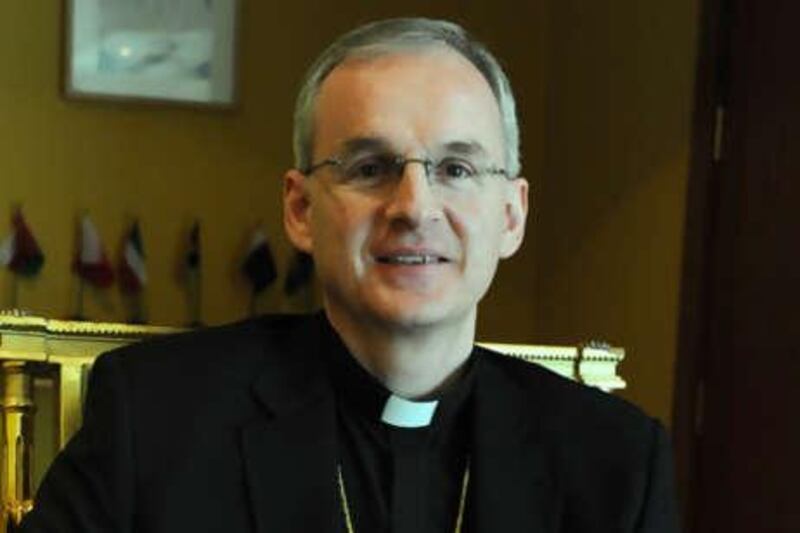As the Catholic Church reaches out to Christians in the region, the Pope's representative in the UAE has praised the country's "openness", which he said had allowed hundreds of thousands of Christians to worship freely and make a living for themselves and their families. "All the Catholics in the country are foreign nationals who have arrived seeking employment, a better living and the means to help their families in their countries of origin," said the Archbishop Petar Rajic. "They are people who are making significant sacrifices in order to make a living and help their loved ones at home. "By reaching out to the Catholics and all Christians, the UAE and all the GCC countries will be providing a good example of openness, acceptance and appreciation to these people who through their hard work and dedication are making significant contributions to the general society in all the countries of the Gulf," he said. Archbishop Rajic, 50, a Canadian of Croatian origin, was speaking to The National in his first interview since his appointment in March as Pope Benedict XVI's representative in the UAE and Yemen. In December, he was appointed the apostolic nuncio to Kuwait, Bahrain and Qatar and the apostolic delegate in the Arabian Peninsula. Last month, the UAE ambassador to the Holy See, Dr Hissa al Otaiba, met the Pope in the Vatican, marking a milestone in diplomatic relations between the UAE and the Vatican. "This is a great sign of the UAE's interest in further developing the good relations that exist between our two states as well as promoting inter-religious dialogue," said Archbishop Rajic. "Christians and Muslims all over the world are coming to the awareness that an open and respectful dialogue is necessary between these two major world religious groups." He said he hoped to visit the UAE to present his credentials "very soon, Inshallah". "The establishing of diplomatic relations is a great start towards the goal of reciprocal recognition, respect and understanding." The Pope heads to Cyprus today, becoming the first pontiff to visit the island. He will meet the president of Cyprus and various diplomatic figures, as well as the Orthodox metropolitan archbishop of Cyprus and members of the Catholic community. "The majority of the Christians in Cyprus are Orthodox, yet there exists a Catholic community as well," said Archbishop Rajic. "It is hoped that the Pope's visit will contribute towards inspiring the two sides and bringing them together to the negotiating table in order to find a just solution to the problems the division of the country has caused." During the visit, the Pope will present the Instrumentum laboris - agenda - for the next special assembly of the Synod of Bishops for the Middle East, which will be held in Rome in October. The archbishop said the Cyprus visit was partly to fit with the synod schedule, and "also partly a continuation of the Pope's previous visit to Malta, another Mediterranean island nation, and his visit to the Holy Land in 2009". During that visit, Pope Benedict also became the first pope to step inside Al Aqsa mosque in Jerusalem, the third holiest site in Islam. Archbishop Rajic said the combination of destinations "symbolically focuses towards the East, a region particularly dear to the holy father". As for the region's Arab Christians, who have come under threat in conflict areas like Iraq, the archbishop said: "Arab Christians have been in the region for centuries. In fact, they trace their roots back to the times of the first Apostles of Christ. "They are not strangers to the region and they can take a certain pride in the fact that they have remained faithful to their Christian identity and religion." The archbishop said he wanted to look at increasing the number of places of worship in the UAE. He said the increasing number of Christians meant there was "an evident need for more space and more structures". Building more churches, he said, was the kind of "concrete gesture" that would help expatriates "feel comfortable in the region and even more integrated and productive members of society". There are about half a million Roman Catholics in the UAE, mostly from the Philippines and India. rghazal@thenational.ae
Praise for 'openness' Christians enjoy in UAE
Catholic Church's representative says the country sets a good example for the region by reaching out to people of other faiths.

Editor's picks
More from the national





